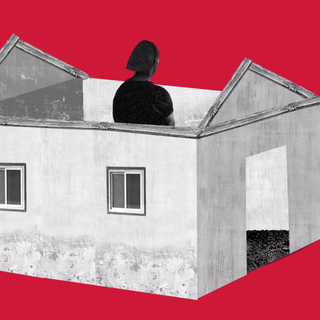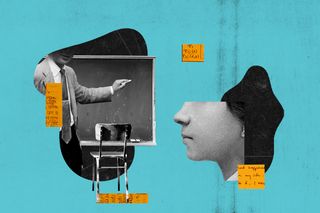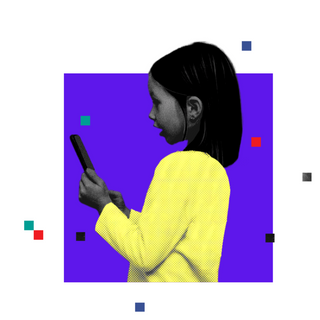
The Feminist Debate: Are Student‑Professor Sexual Relationships Always Unethical?
When desire and learning are entangled, power could either compromise or enhance both.

In Feminist Debates, we pit feminist arguments about power, sex, work, and love against each other — and unpack the grey areas.
Here’s a lesser-known fact about bell hooks: she slept with her student.
By her own account, it happened after the course was completed, but the desire existed beforehand. “Student devotion to a teacher can easily be a context where erotic longings emerge… It cannot be policed or outlawed,” she wrote in an article making a case for “passionate pedagogy.”
Clearly, there are a few things that are wrong about student-professor sex – but with some of these, they’re what make it feel right.
hooks may have been the professor, but she was also a Black woman in an institution of power, who became intimate with a male student. Later, the student wrote to her: “I was young and inexperienced and even though it was exciting that you desired me, it was also frightening.”
The hooks case raises several questions about sexual relationships between students and professors – and feminists have come to loggerheads over it. What exactly is so troubling, and yet so freeing, about desire transacted across teaching lines?
Western feminists have debated and studied these issues since the last century,when women entering higher education also coincided with the sexual liberation movements. Together, they coalesced into exploitation, power, and control, becoming bedfellows (literally) with desire, agency, and liberation.
While these conversations haven’t formally taken root in India, there have been some inklings. Sexual relationships between academics and students are alive and well under the radar – as online forums, literature, Bollywood, and even popular porn categories show. A few years ago, an explosion of #MeToo allegations against professors in India sparked the beginning of this debate – but it halted just as it began. Accused professors defended themselves on the ground that the relationships were consensual.
But what does consent in this context really mean? And equally important is the aspect of liberty: in a country where women’s higher education continues to be a right to fight for, would the proposition of sex and desire within the education space transform into a dangerous obstacle, or a liberating pathway into adulthood — and even intellectual maturity?
Who is really in control, and does power complicate desire, consent?
Many feminists have argued passionately against student-professor sex on the grounds that when power flows top-down, there’s no room for consent. Billie Wright Dziech, one of the foremost advocates for banning student-professor relationships, was of the view that all such unequal relationships are inherently exploitative.
Even when students do acquiesce to getting intimate with professors who initiate it – and even if they initiate the relationship themselves – their consent is not necessarily implied.
But as the bell hooks case shows, the gendered dynamics aren’t always as straightforward as that. Does it mean the institutional power in the hands of a professor, no matter who they are, overrides all else? Not necessarily.
Related on The Swaddle:
What Consent Culture Gets Wrong About Sex
The flipside: it’s patriarchal to assume that women students wouldn’t have any agency.
As more universities began to place restrictions on these relationships, a common critique of the rules was that they undermine a student’s agency as an adult. These rules also imply that all sexual dynamics are heterosexual and patriarchal, with the professor an all-powerful man and the student a helpless, victimized woman.
But sometimes, it’s this very power dynamic that people actively consent to – and find sexy. In fact, an intimate relationship with an intellectual superior can subvert the power dynamic.
Protectionist attitudes towards women and sex, however, have ensured that in India, the University Grants Commission doesn’t even recognize relationships in this context. This steeps these relationships in further silence – preventing recourse for when they go wrong.And banning them altogether could “create a climate of silence and taboo that would only intensify dynamics of coercion and exploitation,” as bell hooks noted.
But allowing sex into teaching can compromise teaching!
While all relationships can have unequal power dynamics, feminist philosopher Amia Srinivasannotes that student-professor relationships are different from others due to the intellectual aspect – an element that desire can compromise.
When young women want their male professors, the question is not whether the desire is right or wrong. But rather, the contention is with the source of desire itself: does she want him, or does she want his knowledge? As feminist and lesbian activist Adrienne Rich observed, compulsory heterosexuality makes women confuse admiration for a woman as competition, and for a man as desire.
Then, a professor perceiving this longing and acting on it would mark their failure as someone with the power to transfer knowledge. It would no longer be a meaningful relationship between student and professor, simply because the desire to learn has been misdirected as a desire for the person from whom one can learn.
The flipside: actually, teaching itself benefits from desire.
On the other hand, maybe talking about the ethics too much can kill the spark – and abuse of power is the exception, not the norm. Some express concern that alarmist fears can compromise the spirit of the classroom – the “erotic” classroom in particular.
To deny desire in the classroom would be to make it a stifling, unfree space, which is bad for learning, the argument goes. “Intellectual magnetism often shades into erotic attraction. Such attachments are not reducible to predatory behavior and, at their best, bring out our best selves,” notes Ayesha Ramachandran, a professor of comparative literature. In other words, desire can be liberating intellectually too.
The bottomline
Talking about sex between students and professors adds several more layers to the conversation about power within feminism. In India, however, the line remains sadly blurred between desire and abuse of power.
“Through these years, we gained some insights into our sexual cultures, where affection and authority, passion and control, brilliance, and perversity are often fused together and sometimes indistinguishable,” wrote V. Geetha, a feminist academic, in a piece explaining her decision to call for the resignation of a journalist after his students accused him of sexual harassment. It speaks to a feminist disappointment with how women’s experiences in education haven’t been dealt with to their fullest extent – with their desire, intellect, and power being neglected questions.
At the heart of the debate is the urgent concern for women’s experience of intellectual growth and learning. The silence on the topic of relationships themselves makes for an uneasy link between desire and abuse of power where there shouldn’t be. Unpacking it is crucial to understanding the inner lives of young women in education – especially when it isn’t something to take for granted.
Rohitha Naraharisetty is a Senior Associate Editor at The Swaddle. She writes about the intersection of gender, caste, social movements, and pop culture. She can be found on Instagram at @rohitha_97 or on Twitter at @romimacaronii.
Related


Children’s Social Media Addiction Is Linked to Inequality, Finds Global Study
